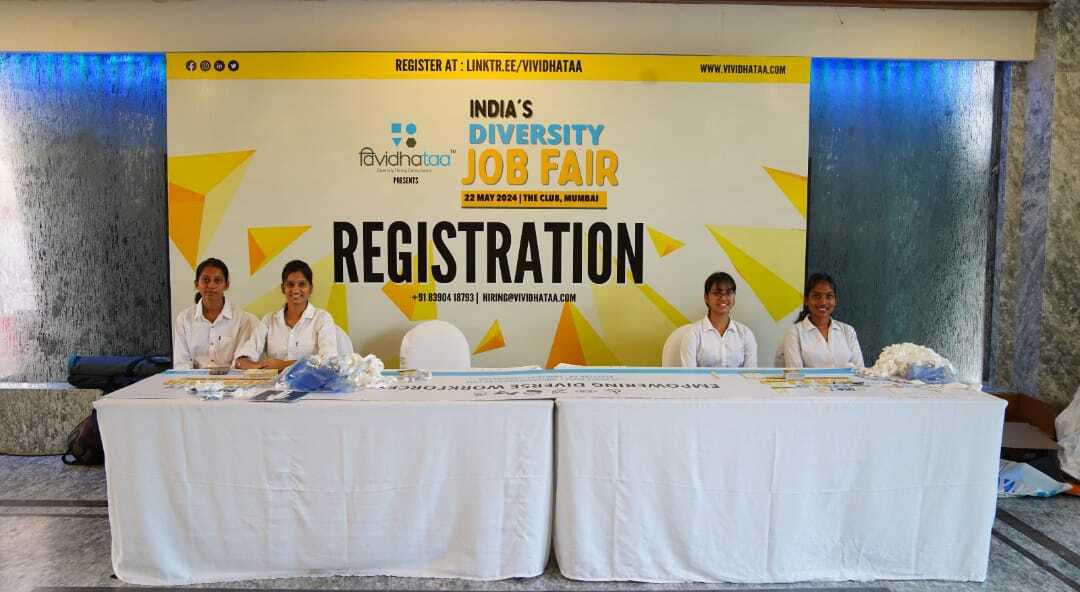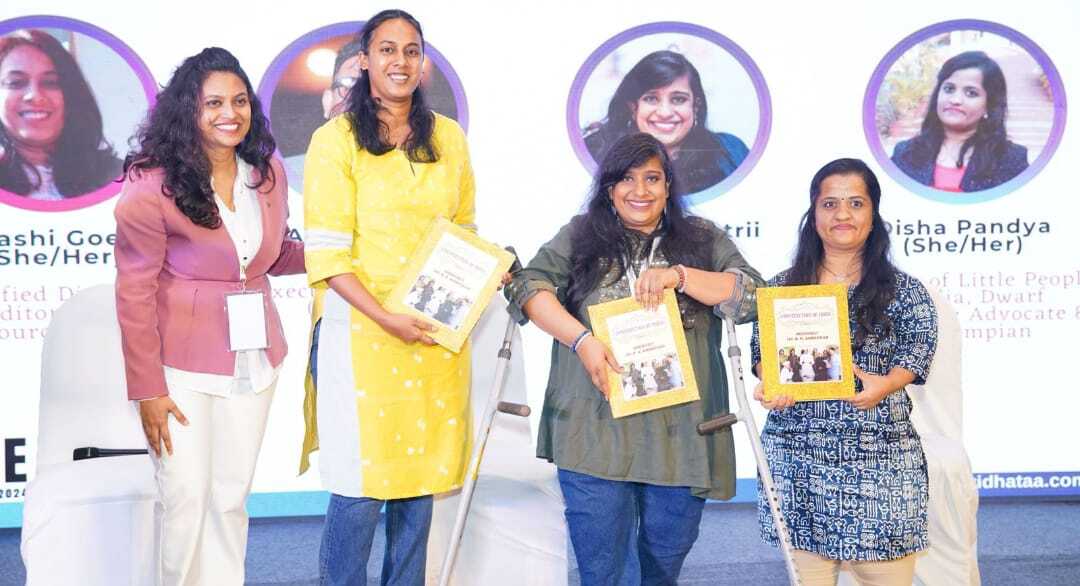Disha Pandya, 39, is an international para-athlete born with Achondroplasia Dwarfism which results in shorter limbs. Though there are no exact figures on the number of people with dwarfism in India, over 25 million Indians have some form of a disability.
Standing 4 feet 2 inches tall, Disha experienced 17 job rejections due to her dwarfism. Today, she is a professional graphic designer with 12 years of experience at companies like the HDFC Bank, Bisleri, and is now the Creative Head at Rich’s India.
Dwarfism, recognised as one of the 19 disabilities in the Persons with Disabilities Bill, mandates equal treatment. Despite their abilities, people with dwarfism often face bias due to their stature.
Halfway across the world, The Little People of America (LPA) describes dwarfism as a condition with an adult height of 4’10” or less.
Similarly, to create a safe and welcoming space for people with a condition similar to hers, Disha founded The Little People of India in February 2024.
LPI is a nationwide organisation with 650+ members and the first community for people with dwarfism in India. Inspired by the LPA, it supports individuals with dwarfism in achieving their potential and living dignified lives.

Since then, she has been striving to help people with dwarfism get employed, avail medical benefits, and even help them with marriage prospects. “For people with dwarfism, life is tough in every aspect, and I want to make it as comfortable for them as I can,” she shares with The Better India.
We sat down with her to understand her story and mission and what she hopes to achieve with her dedicated job fairs.
How targeted opportunities help
One of the biggest hindrances people with dwarfism face is in getting jobs. Many companies hesitate to hire people with dwarfism, worrying they might not blend well with other employees or fit within the company’s infrastructural setup, explains Disha from her personal experience.
In May this year, at The Club Juhu in Mumbai, The Little People of India, along with Vividhataa, an organisation focused on sensitising companies and helping them fulfil their diversity hiring requirements, conducted a ‘Diversity Job Fair’ in Mumbai.
It had diverse candidates ranging from LGBTQIA+ individuals, women with career breaks, army veterans, acid attack survivors, and people from other socio-economic minority groups participating in it, and saw almost 500 people get interviewed.
“We want to change diversity ratios in organisations by initiating conversations and influencing decisions by showcasing that hiring based on DEI (Diversity, Equity and Inclusion) is the way forward,” says Ratnaprabha Sable, the founder and managing director of Vividhataa.
The open-to-all DEI seminar/conference was attended by corporate delegates along with students, researchers, experts, DE&I advocates, and similar activists from all over India.
Multiple panel discussions, fireside chats, and interactive workshops such as one-on-one sign language were held at the event. With a focus on promoting empathy and understanding, Vividhataa plans to make DEI a top priority for Indian organisations and global MNCs across India through its initiative.
When the COVID-19 pandemic hit in 2020 and traditional job fairs couldn’t take place due to the lockdown, Vividhataa filled the gap by launching “India’s 1st Virtual Diversity Job Fair 2020” to support minority candidates.
The job fair saw lots of diverse candidates submitting their résumés to potential employers and becoming a beacon of hope in an otherwise challenging job market. Some celebrated promising job offers, while others prepared for successive rounds of interviews.
“Two people with dwarfism got employed with Amazon through the fair. Since they were working from places where Amazon didn’t have offices, they were given WFH opportunities. A laptop, a table, and every other work equipment that they might need were also provided by the company,” she says.
Because the word of the job fair had spread around, organisations which previously were not big on hiring candidates with disabilities had shown up as well.
The long-term impact of equal opportunities on the community
Disha says that to her knowledge, there are two more organisations that work for people with dwarfism in southern India, but are only restricted to a few states.
Given that The Little People of India is the only pan-India organisation working for the community, and that Disha is an internationally-acclaimed para athlete, her organisation came into the limelight in the last few years.

“I have represented people with dwarfism in various marathons. At every chance I got, I advocated for the rights of people with dwarfism, and others have seen our community grow ever since,” she adds.
While talking about the job fair, Disha says that in an average scenario, if there are 50 applicants, and one among them has a disability, he/she may feel lost. But at the fair, everyone felt safe because they knew that they wouldn’t be judged based on their appearance.
“They know that their education, experience, and what they bring to the table is all that matters here,” she adds.
Vilas Dahipale, an LPI member based in Pune who was born with dwarfism, holds an engineering degree but got rejected by over 20 companies. After a relative helped him get a job, he worked without a salary for the first few months.
In the meanwhile, he updated his résumé with skills such as automation testing, and after a span of over 3 years, he has now been offered a job at Accenture with a pick-up/drop-off service, thanks to the job fair.
“Many companies take your résumé online but don’t actually consider you as a candidate if you have a disability,” he says. After switching various fields upon realising his limitations (for instance, field work was taxing for Vilas given his height), he decided that he could only do office-based or remote work.
He admits that he was initially unaware that companies offer jobs to people with disabilities. “Learning that there was a separate ‘handicapped’ category on job portals was a revelation to me,” admits Vilas.
After he revealed his condition on job portals, he started receiving calls from employees who were looking to hire handicapped candidates. “The saddest part is that most companies who are open to hiring candidates with disabilities are MNCs from the US and Europe, and not Indian companies,” rues Vilas.
Prakruthi, a 21-year-old LPI member born with dwarfism, is all set to do her postgraduate diploma in management. She says that she is afraid employers won’t think of her as a real candidate due to her height, but the silver lining is that she has the job fair to look forward to in the future.
Having done two internships during her undergraduate at Teresian College in Karnataka, she admits to her classmates taking pictures of her and mocking her for her height, which went on to affect her marks and her morale. But she took a stand for herself which helped her blossom personally.
Her message to her bullies? “Don’t treat anyone else the way you treated me,” she says.
Meanwhile, Disha shares how she got her first job offer in Mumbai in a small ICICI home-loan third-party office after giving 17 interviews. When she finished her graduation in early 2000s, there were no online job portals.
“There were only classified columns in newspapers, and walk-in interviews,” she shares.
Recounting an experience of going to Sab TV for an interview, the response she was met was this, “Sab kuch theek hai, par aap thode alag ho” (Everything is fine, but you are a bit different).
She was told that the employees at the company may not be comfortable with her presence.
“Hiring candidates with disabilities is not something that most corporate organisations in India are too keen on because they don’t see it as directly generating income or business for their companies,” says Ratnaprabha.
As social awareness on disability has increased in the last few years, organisations have understood the need to back diverse candidates and have started to more thoroughly follow the ES&T (Employments through Skills, Training and Placement) guidelines.
“Conducting a job fair which spreads awareness on issues like disabilities, socio-economic marginalisation and caste, something that most organisations shy away from, was a challenge,” admits Ratnaprabha.
Urging people not to judge individuals based on their disabilities, Disha adds, “Being judgemental is a disability itself, and it’s not even visible.”
Edited by Padmashree Pande; Pictures courtesy: Disha Pandya
No comments:
Post a Comment